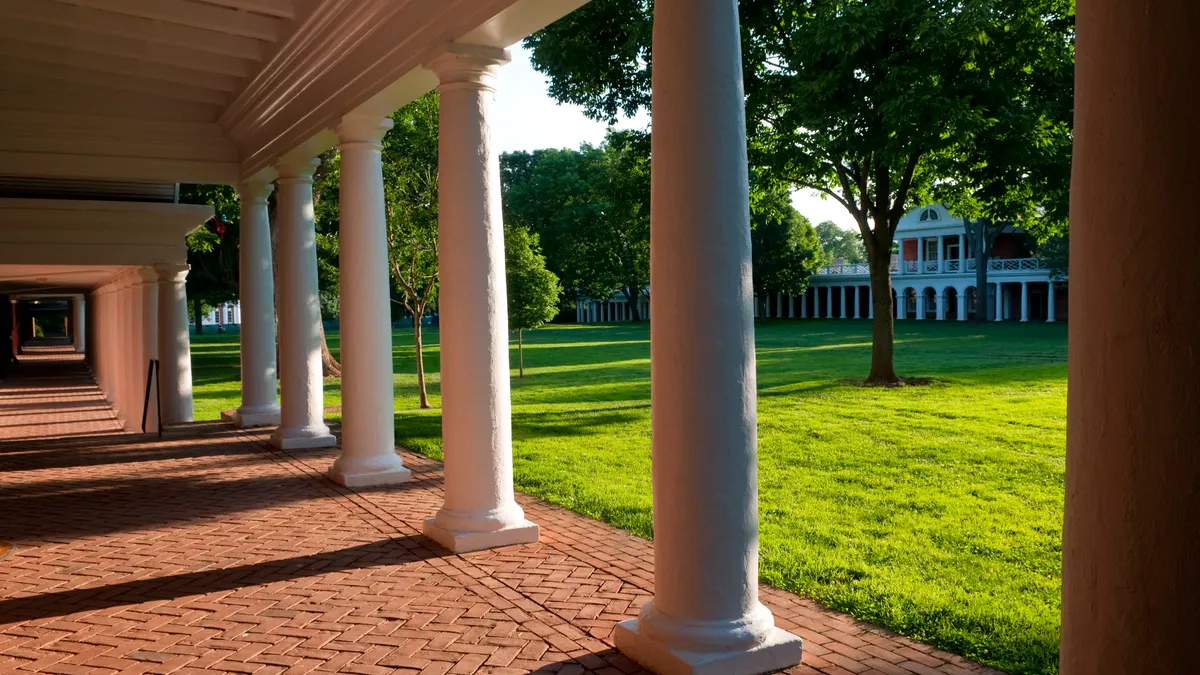Dive Brief:
- The University of Virginia updated its protest policies Monday to include a ban on encampments and to require anyone wearing a mask on campus to provide identification when requested by university officials.
- The state flagship also laid out its penalty system for "willful noncompliance with University policies." Following a warning, students may be temporarily suspended, disenrolled from their classes and barred from campuses, pending a campus judiciary hearing.
- Arrests are intended to be the last resort, according to university officials. “Even in cases where we observe conduct that is out of compliance with University policies, our goal is to resolve the issue at the lowest level possible," Kenyon Bonner, vice president and chief student affairs officer, said in a Monday statement.
Dive Insight:
In anticipation of the fall semester, colleges are revising their policies on public assembly in the hopes of avoiding a repeat of the tumultuous spring semester, when pro-Palestinian encampments cropped up on campuses nationwide.
This month, the University of California and California State University — collectively home to some 751,000 students — announced bans on encampments and unauthorized structures, like barricades. The systems also barred people from wearing masks with the goal of concealing their identities.
The University of Virginia outlined similar rules Monday.
People affiliated with the university can use outdoor areas for protests only if they do not "restrict equal access to shared University spaces" or take place between 2 a.m. and 6 a.m.
Tents are prohibited without prior approval from the university's fire safety office. They also must be taken down between midnight and 6 a.m. or after 18 hours.
Officials also said demonstrators are banned from wearing face coverings to conceal their identities, consistent with Virginia law.
“The right to free expression and free inquiry is foundational to our democracy and to UVA,” university President Jim Ryan said. “In that spirit, we do our best to ensure that any regulations we place on expressive activities are content-neutral and strike the right balance, promoting free expression and ensuring that our Grounds are safe, welcoming and accessible for everyone.”
Prior to the University of Virginia’s announcement, the American Association of University Professors decried the trend of colleges creating “overly restrictive protest policies” in an Aug. 14 statement.
AAUP specifically called out policies that require registration for protests, limit where demonstrations can be held and impose "harsh sanctions" that could chill student and faculty engagement.
"These policies severely undermine the academic freedom and freedom of speech and expression that are fundamental to higher education," it said.
Many of the new policies are being enacted with "little to no faculty input," and will curtail their right to speak and write as citizens without institutional censorship or discipline, according to AAUP.
The University of Virginia's policy announcement comes after a chaotic spring semester, when officials called Virginia State Police to clear out an encampment on campus.
At the time, Ryan said that a protest began on April 30 and had complied with the university's policies, including those barring tents without permits, until the night of May 4. At that point, the gathering grew and began to pose a safety concern, he said.
"Despite numerous requests to comply with multiple University policies, the protesters refused," he said in a May 5 statement. "We hoped and tried to handle this locally. But when [the University Police Division’s] attempts to resolve the situation were met with physical confrontation and attempted assault, it became necessary to rely on assistance from the Virginia State Police."
Although Ryan later said he was monitoring the situation as it unfolded, he said he did not approach the demonstrators for fear that his presence "would inflame the situation, rather than de-escalate it,” according to a university announcement.
Over 50 officers responded, deploying pepper spray, clearing the encampment and arresting 27 people. One was charged with assault, but the case was dismissed amid video evidence and witness accounts refuting a police officer’s criminal complaint, The Daily Progress reported.
The move to involve law enforcement promptly drew backlash from faculty.
The following week, the faculty senate called for an external review of what transpired and voted for the results to be made public.
And an open letter from the university's history faculty said the administration’s version of events wasn’t credible.
Signatories said, prior to the university's involvement of the police, faculty and administrators had successfully worked with students to keep the protests peaceful.
But hours before the police began arresting protesters, the university quietly removed a clause in its no-tent policy allowing an exemption for tents for camping, according to The Daily Progress.
"We are thus stunned by the University’s unilateral eleventh-hour decision to change campus rules on the presence of 'recreational tents' and mobilize the Virginia State Police on Saturday morning," the faculty letter said. "In doing so, the UVa administration created the very conditions that it had worked to avoid — chaos, conflict, and violence."















